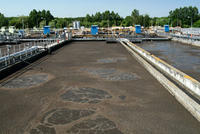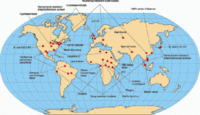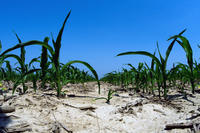-
The sobering reality of water security
Agriculture is one of the world’s most insatiable consumers of water. Yet, it is facing growing competition for water from cities, industry, and recreation at a time when demand for food is rising, and water is expected to become increasingly scarce.
-
-
Genetically modified crops are overregulated: expert

It has been almost twenty years since the first genetically modified foods showed up in produce aisles throughout the United States and the rest of the world, but controversy continues to surround the products and their regulation.
-
-
Toxic legacy of lead pollution persists despite regulatory efforts, modest gains
Efforts to reduce lead pollution have paid off in many ways, yet the problem persists and will probably continue to affect the health of people and animals well into the future. The good news, he said, is that atmospheric lead concentrations in the United States have fallen by 89 percent in the past three decades.The bad news is that blood lead levels are still about 100 times higher than the natural background level, and there is no known threshold for lead toxicity. In other words, even tiny amounts of lead in the body can be harmful.
-
-
Third U.K. coronavirus infection suggests person-to-person transmission
A third person has contracted the new coronavirus and is being treated in an isolation room of the Queen Elizabeth Hospital in Birmingham and is in stable condition. Worldwide, there have been eleven cases diagnosed, and the disease has killed almost half of them. According to medical experts, the new strain was detected three months ago and this is the first time it has been known to pass between people, which suggest it may not be particularly infectious.
-
-
Sewage lagoons remove most pharmaceuticals from wastewater

Despite these advances made under the Clean Water Act, sewage remains a major source of pharmaceuticals and personal care products (PPCPs) and naturally occurring hormones found in the environment. New research shows the effectiveness of rural lagoon systems at removing these compounds from wastewater.
-
-
Expanding biological control of crop pests
A new discovery promises to allow expanded use of a mainstay biological pest control method, which avoids the health, environmental, and pest-resistance concerns of traditional insecticides, scientists are reporting. This advance broadens the applicability of the so-called sterile insect technique (SIT).
-
-
Surveillance system identifies, tracks emerging infectious diseases
Researchers have developed a method to identify the cause of infectious disease outbreaks based on online reports about the symptoms, the season, and the ratio of cases to fatalities. Using data from the Internet outbreak reporting system ProMED-mail, the researchers applied this method to more than 100 outbreaks of encephalitis in South Asia, recently identified as an emerging infectious disease “hotspot.”
-
-
Old, faulty bores jeopardize Australia's water
Australian homes, towns, cities, farmers, and miners will rely increasingly on underground water as the country’s population grows, surface water supplies dwindle, and as droughts multiply under a warming climate. Trouble is, the authorities in charge do not have a clear idea exactly how much groundwater there is, how rapidly it is recharged — or how quickly it is being depleted. What is known is based on data largely supplied by 23,000 monitoring bores spread across the continent — more than two thirds of which are now falling into disrepair.
-
-
DNA sequencing a serious risk to privacy
The growing ease of DNA sequencing has led to enormous advancements in the scientific field. Through extensive networked databases, researchers can access genetic information to gain valuable knowledge about causative and preventative factors for disease, and identify new targets for future treatments. The wider availability of such information, however, also has a significant downside — the risk of revealing personal information. New study finds that new policies are needed to safeguard participants’ identity in genetic studies.
-
-
Massachusetts moves against unscrupulous compounding pharmas
State regulators in Massachusetts have shut down or cited thirty-two of the state’s forty compounding pharmacies as a result of a nationwide fungal meningitis outbreak. The outbreak killed forty-five people and sickened 696, who required hospitalization.
-
-
Climate change threatens public health, safety, economy along U.S. coasts
A new technical study from the U.S. National Oceanic and Atmospheric Agency (NOAA) and the U.S. Geological Survey (USGS) reports that the effects of climate change will continue to threaten the health and vitality of U.S. coastal communities’ social, economic, and natural systems. All U.S. coasts are highly vulnerable to the effects of climate change such as sea-level rise, erosion, storms, and flooding, especially in the more populated low-lying parts of the U.S. coast along the Gulf of Mexico, Mid-Atlantic, northern Alaska, Hawaii, and island territories. The report says that the financial risks associated with both private and public hazard insurance are expected to increase dramatically.
-
-
Improving mapping of infectious disease

Since the mid-nineteenth century, maps have helped elucidate the deadly mysteries of diseases like cholera and yellow fever. Yet today’s global mapping of infectious diseases is considerably unreliable and may do little to inform the control of potential outbreaks, according to a new systematic mapping review of all clinically important infectious diseases known to humans. The study recommends new tools to improve global mapping of infectious disease.
-
-
Arizona may require hospitals to report undocumented immigrants seeking care
A bill before the Arizona legislature aims to track how many undocumented immigrants are receiving free medical care at hospitals in Arizona. The bill would require hospitals to confirm a person’s legal presence in the country if the individual seeking care does not have insurance. If the staff thinks the patient is here illegally, they must notify authorities.
-
-
Promising substance for better cyanide antidote for terrorist attacks
In an advance toward closing a major gap in defenses against terrorist attacks and other mass casualty events, scientists are reporting discovery of a promising substance that could be the basis for development of a better antidote for cyanide poisoning.
-
-
The historical probability of drought

Droughts can severely limit crop growth, causing yearly losses of around $8 billion in the United States. It may be possible, however, to minimize those losses if farmers can synchronize the growth of crops with periods of time when drought is less likely to occur. Researchers are working to create a reliable “calendar” of seasonal drought patterns that could help farmers optimize crop production by avoiding days prone to drought.
-
More headlines
The long view
A Shining Star in a Contentious Legacy: Could Marty Makary Be the Saving Grace of a Divisive Presidency?
While much of the Trump administration has sparked controversy, the FDA’s consumer-first reforms may be remembered as its brightest legacy. From AI-driven drug reviews to bans on artificial dyes, the FDA’s agenda resonates with the public in ways few Trump-era policies have.
